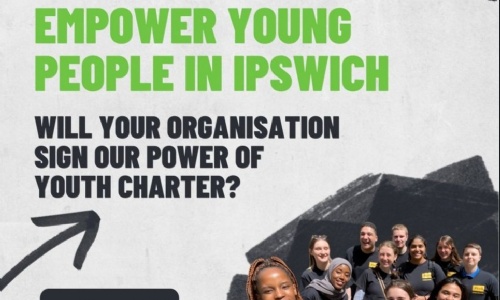The Power of Youth

Colin Kreidewolf, Ipswich Borough Councillor for Westgate Ward talks about the power of youth in place based work.
As Ipswich Borough Council refreshes its corporate plan it’s important to consider the voices of young people and how they can be incorporated into an updated plan. The current plan focuses on a strong Ipswich economy; a sustainable environment; a healthy community; quality homes for all; and an enjoyable place to live, work and play.
Personally I am supportive of the Power of Youth Charter, and it is a great starting point to demonstrate an organisation's commitment to youth. But it’s important that the sentiments behind the charter are embedded into the processes of an organisation such as Ipswich Borough Council. Signing the charter will show commitment, but we need to think beyond that.
The #iwill movement, which promotes The Power of Youth Charter, views young people as the leaders of tomorrow, and we need to remove the disconnect in society between authorities and young people and allow young people to thrive. Society will benefit.
So, how would young people contribute to the development of plans and policies for authorities?
Ipswich Borough Council's corporate plan will evolve over time but some of the key elements are particularly important to young people such as the provision and access to good quality frontline services; quality and affordable homes, as well as the move to a carbon-neutral council and how we respond to the climate crisis within the constraints of ensuring that we are a financially sustainable council. When designing services the views of young people should be specifically solicited.
Achieving engagement is no easy task. Politics and decision-making can appear frustrating, too formal and remote, particularly for young people. However, it is vital that we achieve that engagement if we are to develop their town for theirs and others benefit. Including voluntary organisations who already have many of those links is vital in ensuring that people from all demographics are represented.
Young people’s participation should be embedded into our processes and there is a responsibility on the council to ensure that children and young people have access to the whole process of participation, engagement, and democracy activities. This cannot be done in isolation and the council already works with several youth related organisations in the voluntary sector. Further research and discussion will be required to find the best way of achieving engagement and giving young people a voice.
There are benefits to accrue to the council from being more inclusive as increased engagement can improve the decision-making process and ensure we develop better polices and processes that are more relevant to more people. Young people’s engagement, participation and democratic involvement can be a key component of the work towards achieving the zero -carbon target for the town. That has been evidenced elsewhere through the development of a Youth Climate Charter elsewhere in the UK and the creation of video content developed by young people as part of Skills for Life programme. Lateral thinking is needed on developing work programmes for young people and this is a good example of such thinking.
For society the desired outcome is to see young people leading their own campaigns and influencing decisions on issues that are important to them, actively involved in volunteering and social-action projects.
Achieving this will be no easy task for authorities, but after the challenges of recent times there are opportunities to improve systems and participation.
These are my personal views and not necessarily the views of Ipswich Borough Council.
